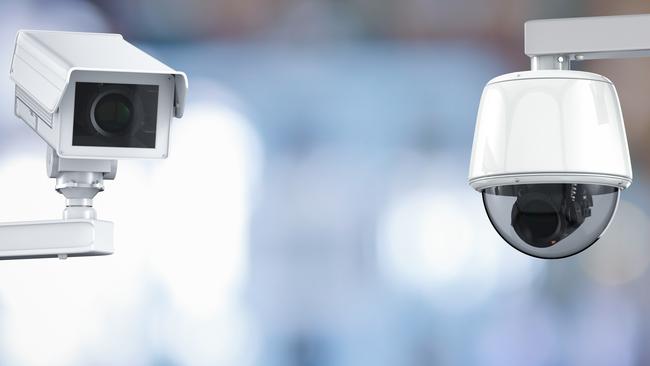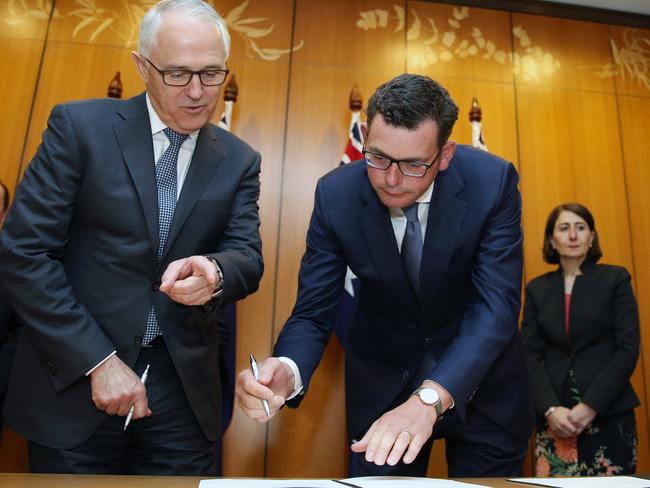David Speers: How technology will help beat terror
CAMERAS and facial recognition technology are everywhere, so why shouldn’t governments share data? David Speers writes.

Opinion
Don't miss out on the headlines from Opinion. Followed categories will be added to My News.
PICTURE this: a passer-by in a busy pedestrian mall overhears two men discussing where they might park a truck.
They don’t look like truck drivers. Something’s just not right. This good citizen calls the terror hotline and police bring up the CCTV footage from the time and location to check out who these characters might be.
Right now it could take several days to confirm their identity. But under the agreement struck between state and federal leaders this week, the ID check will be instant.
If it turns out that these two men are already on the radar for suspicious activity, police can swoop immediately rather than waiting up to a week.
This exact scenario was put forward by federal security agencies in arguing for access to state driver’s licence databases.
Another scenario involves responding to a child abduction, another crime where every minute counts.
CCTV cameras might have missed the actual abduction, but caught an image of a suspicious-looking man moments before the child disappeared. An instant ID check speeds up the urgent investigation and potentially saves a life.

These are powerful arguments. State and territory leaders didn’t hesitate to sign up.
The country’s most left-wing premier, Victoria’s Daniel Andrews, was the strongest backer both in the meeting and the press conference that followed.
He and his NSW counterpart Gladys Berejiklian are the ones dealing with the very real threat of terrorism on their streets.
Over the past three years, state and federal agencies have disrupted 13 terrorist attacks.
When they make a case for new tools to do their work, politicians have a duty to respond.
Some, however, ignore all of this. They either pretend terrorism isn’t a serious threat or think police can magically keep us safe.
Greens senator Nick McKim is among them.
“Creating a massive database of people’s photographs is a privacy invasion that creates a honey pot for hackers,” he warned.
Of course privacy is important. Civil liberties are more than a “luxury” as Daniel Andrews suggested.
But let’s be clear about what’s being discussed here.
State police already have access to driver’s licence photos. Guess what? They access them when trying to solve a crime.
And yes, there’s already a risk this database could be hacked. But has that stopped Nick McKim getting a driver’s licence?
I doubt it.
Police already access CCTV footage when trying to solve crimes. They already use facial recognition to find out who a suspect is.
The change agreed to this week will simply allow that data to be shared more quickly between federal and state police agencies than it currently is. That’s it.
The truth is civil liberties groups (and presumably the Greens) are more concerned about the prolific spread of CCTV cameras and the rapid advances in facial recognition software. Fair enough, this is a legitimate privacy concern.

But this is happening regardless of anything COAG leaders did this week.
Private businesses are already installing cameras everywhere. These unblinking black domes peer down at us in shopping centres, football stadiums, car parks, convenience stores and taxis. They’ve become a part of life. Being watched in public places isn’t ideal, but the CCTV cameras deter crime and they help solve it.
There’s no stopping the rollout of facial recognition technology either.
The new Apple iPhone screen can be unlocked by peering at the screen.
Some airlines are starting to use facial recognition instead of a paper boarding pass.
Footy stadiums use the technology to identify troublemakers.
And a KFC outlet in China even lets customers pay for their order with a facial scan. The technology isn’t foolproof but it’s improving rapidly.
So why shouldn’t police have the ability to use this technology as well if they’re trying to keep us safe?
Queensland Premier Annastacia Palaszczuk wants these arrangements in place before the Gold Coast Commonwealth Games in April. Who can blame her? If police got wind of a plot to attack the Games, the ability to identify a suspect with a CCTV camera on an entry gate might be very helpful indeed.
Here’s a simple question: would you feel safer in the crowd knowing police had this capability? Or outraged at the privacy invasion?
There are legitimate concerns around who else might have access to this national biometric database.
Some authorities say Centrelink and even private banks should eventually be given access to speed up the identity checks their customers want them to undertake. This must be handled sensitively. But if it’s simply speeding up access to data that’s already accessible, what’s the problem?
Our federal and state leaders are good at bickering over energy, infrastructure, hospitals and schools. On national security they should be applauded for working together.
David Speers is the political editor at Sky News.
